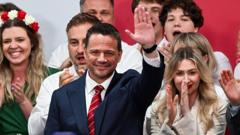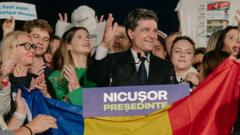In Vatican City, older cardinals, while not participating in the papal election, are closely watching the proceedings and offering their thoughts on potential candidates.
Cardinals Reflect on Conclave Dynamics Despite Non-Voting Status

Cardinals Reflect on Conclave Dynamics Despite Non-Voting Status
As younger cardinals engage in the papal election process, older cardinals share valuable insights from their observations in the Vatican.
Cardinal Domenico Calcagno, at 82 years old, finds himself excluded from voting this conclave but remains an engaged observer. “You exchange opinions and assessments at the table,” he remarked, emphasizing the importance of informal discussions that occur during meals at the Casa Santa Marta guesthouse, where the cardinals reside during the conclave.
Younger cardinals, such as Cardinal Fridolin Ambongo, 65, have delivered impactful speeches that caught the attention of their older counterparts. Cardinal Gianfranco Ravasi, 82, a former head of the Pontifical Council for Culture, expressed admiration for Cardinal Jean-Marc Aveline from Marseille, who has shown promise as a papal candidate by presenting a speech eloquently in Italian.
The voting process takes place multiple times daily, with the first ballot often viewed as a “dress rehearsal,” according to Calcagno, who explains how initial preferences tend to shift as discussions unfold. Success needs a two-thirds majority, with outcomes signaled by either black smoke for no decision or white smoke indicating a new pope.
Ravasi also noted that the speeches made during the conclave reflect the cardinals’ hopes for the Church, especially in light of significant global issues. The behind-the-scenes interactions, especially in the evenings, foster camaraderie among the cardinals. “You can meet cardinals from other nations… and get your thoughts straight,” Calcagno added.
With the conclave ongoing, these older decisions—and their insights—provide a unique perspective on the future of the papacy, reinforcing the vital role of both voting and non-voting cardinals.
Emma Bubola, reporting from Vatican City.
Younger cardinals, such as Cardinal Fridolin Ambongo, 65, have delivered impactful speeches that caught the attention of their older counterparts. Cardinal Gianfranco Ravasi, 82, a former head of the Pontifical Council for Culture, expressed admiration for Cardinal Jean-Marc Aveline from Marseille, who has shown promise as a papal candidate by presenting a speech eloquently in Italian.
The voting process takes place multiple times daily, with the first ballot often viewed as a “dress rehearsal,” according to Calcagno, who explains how initial preferences tend to shift as discussions unfold. Success needs a two-thirds majority, with outcomes signaled by either black smoke for no decision or white smoke indicating a new pope.
Ravasi also noted that the speeches made during the conclave reflect the cardinals’ hopes for the Church, especially in light of significant global issues. The behind-the-scenes interactions, especially in the evenings, foster camaraderie among the cardinals. “You can meet cardinals from other nations… and get your thoughts straight,” Calcagno added.
With the conclave ongoing, these older decisions—and their insights—provide a unique perspective on the future of the papacy, reinforcing the vital role of both voting and non-voting cardinals.
Emma Bubola, reporting from Vatican City.






















